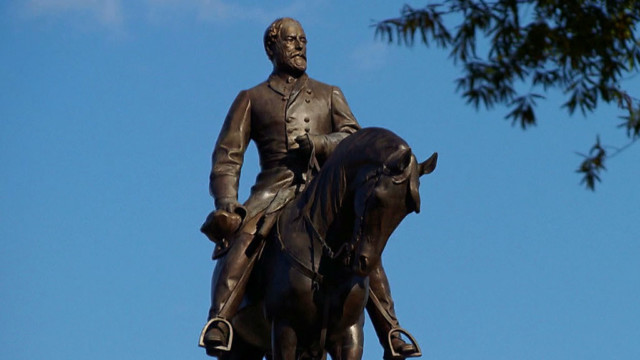Charlottesville, Virginia, this summer was the moment Americans fought each other over the legacy of a civil war that tore their country apart more than 150 years earlier.
Clashes between white supremacists and protesters including militant left-wing activists ended in fresh tragedy – a woman was killed when she was run over as crowds rallied to oppose the statue of General Robert E Lee, the Confederate General who led southern breakaway states into battle against their Northern neighbours.
That war ended with the abolition of slavery. But the U.S. never properly healed.
CGTN’s Owen Fairclough reports.
Christy Coleman, the Chief Executive of Richmond’s American Civil War Museum, said the current unrest is as significant as the violence over African American civil rights in 1960s, adding: “We’re seeing violence, the rise of violence and a very ugly underbelly of American culture that no longer feels that it has to check itself.”
That part of American culture has been growing ever more visible since the arguments over the Confederate flag and monuments resurfaced in the wake of Dylann Roof’s murder of nine African American churchgoers two years ago.
A photograph of him posing with the Confederate flag put pressure on state governments to stop flying it.
Then attention switched to Confederate monuments. The one dedicated to General Lee in Charlottesville was covered up, while others in the U.S. have been quietly taken down by authorities or, in Durham, North Carolina, torn down.
President Donald Trump has also amplified the debate, weighing in to back those who want to keep the monuments.
As the former seat of the Confederate government, Virginia’s capital Richmond has the most prominent collection of Confederate monuments. Its Monument Avenue is the centerpiece of its tourism trail. Richmonders must now decide their future
Christy Coleman co-chairs the commission charged with that task.
She supports keeping them but is grappling with a complex postwar legacy that must account for what individual communities want.
She said: “It is a memorial period, basically the 1880s through the early 20th Century when a lot of these veterans were dying off and people were building monuments to their memory . But it is equally a time when white supremacy, particularly in the south was reassessing itself in a horrific manner, when there was domestic terrorism that is running rampant and unchecked and they are not coincidental.”
The U.S. isn’t first country faced with a dilemma and a struggle between the accepted facts of history and heritage – something that’s much more individual and for public historians like Coleman, must be factored into these kinds of discussions.
When the allies toppled the Nazi regime at the end of the Second World War, they destroyed its most prominent Nazi symbols – detonating the Swastika that topped the site of the Nuremberg rallies.
But camps like Auschwitz were preserved to explain the Holocaust in graphic detail.
Many here in the U.S. think Confederate memorials should also be preserved.
Robert Lee Hodge has spent his lifetime steeped in Confederate history, as a Civil War reenactor, historian and film maker.
We meet in a park off the downtown in Tennessee, where so far, a monument depicting a Confederate soldier appears to be off the radar for protests. “When I look at these things I don’t see glorification, I see sadness. Look at his head bent down, his back hunched,” Hodge declared.
He’s adamant these kinds of memorials should stand, but thinks additional context is required.
“Let’s add additional signage as to why, the specifics of why. But to take the things down. That reminds of things Hitler did or Stalin did, or in more recent times the Taliban. I never thought I’d see monuments torn down in the U.S.”
Back in Richmond, the consultation for what to do with the city’s Confederate monuments is due to end early next year.
Removing them would require a change in local laws, though Coleman thinks this may not end the debate over a painful past.
She adds: “Because the American Civil War was America’s greatest trauma for many many years as well as a reflection of her greatest sin, no one has ever really wanted to address that. So we are in a perpetual state, no longer of shock, but the denial and the bargaining.”
Ray Baker talks about US race relations one year into the Trump Presidency
CGTN’s Wang Guan spoke with Ray Baker about racial tensions in the U.S. Baker is the host and executive producer of the Public Agenda, a podcast that examines race, politics and social justice in today’s culture.
 CGTN America
CGTN America

